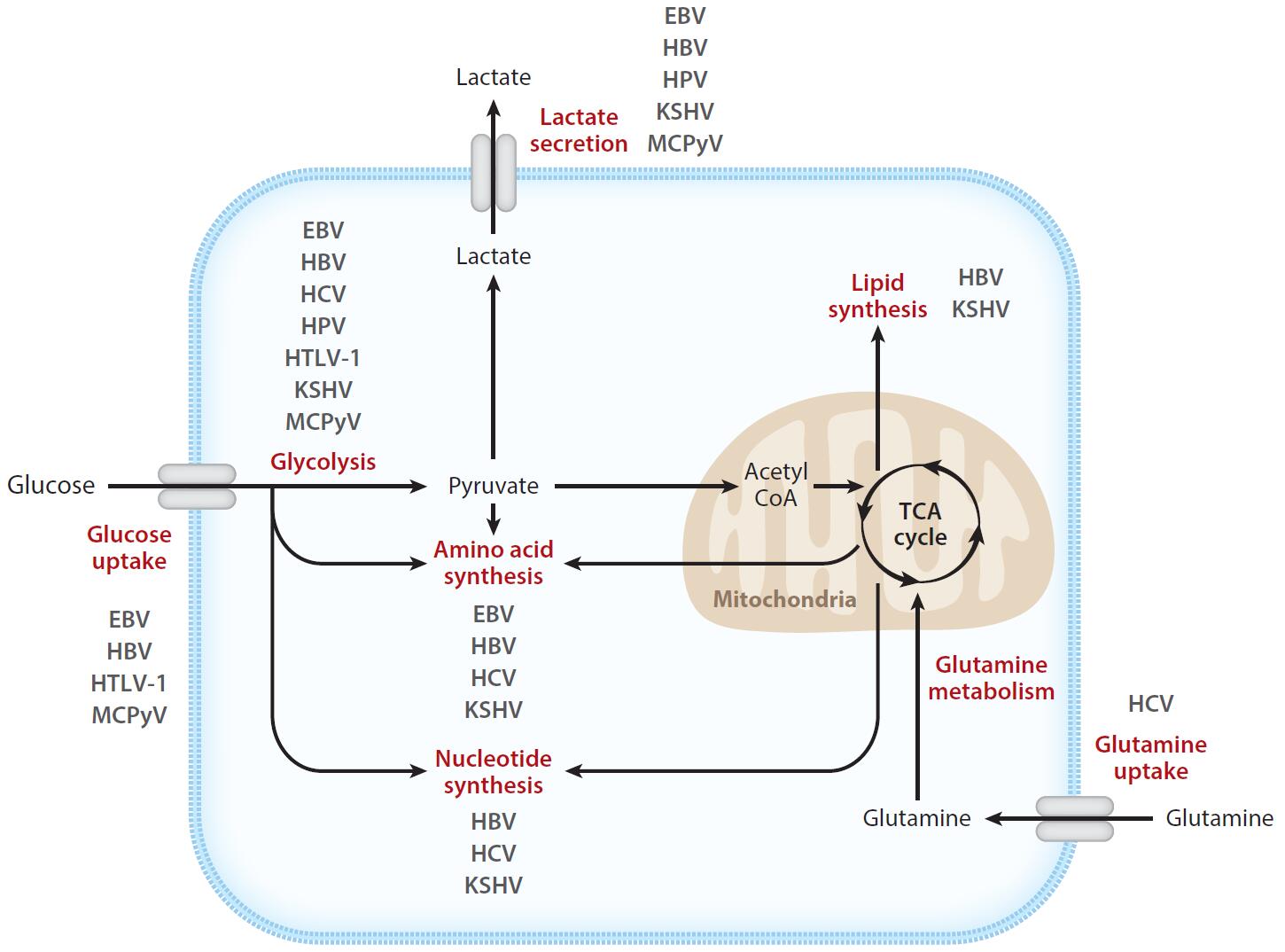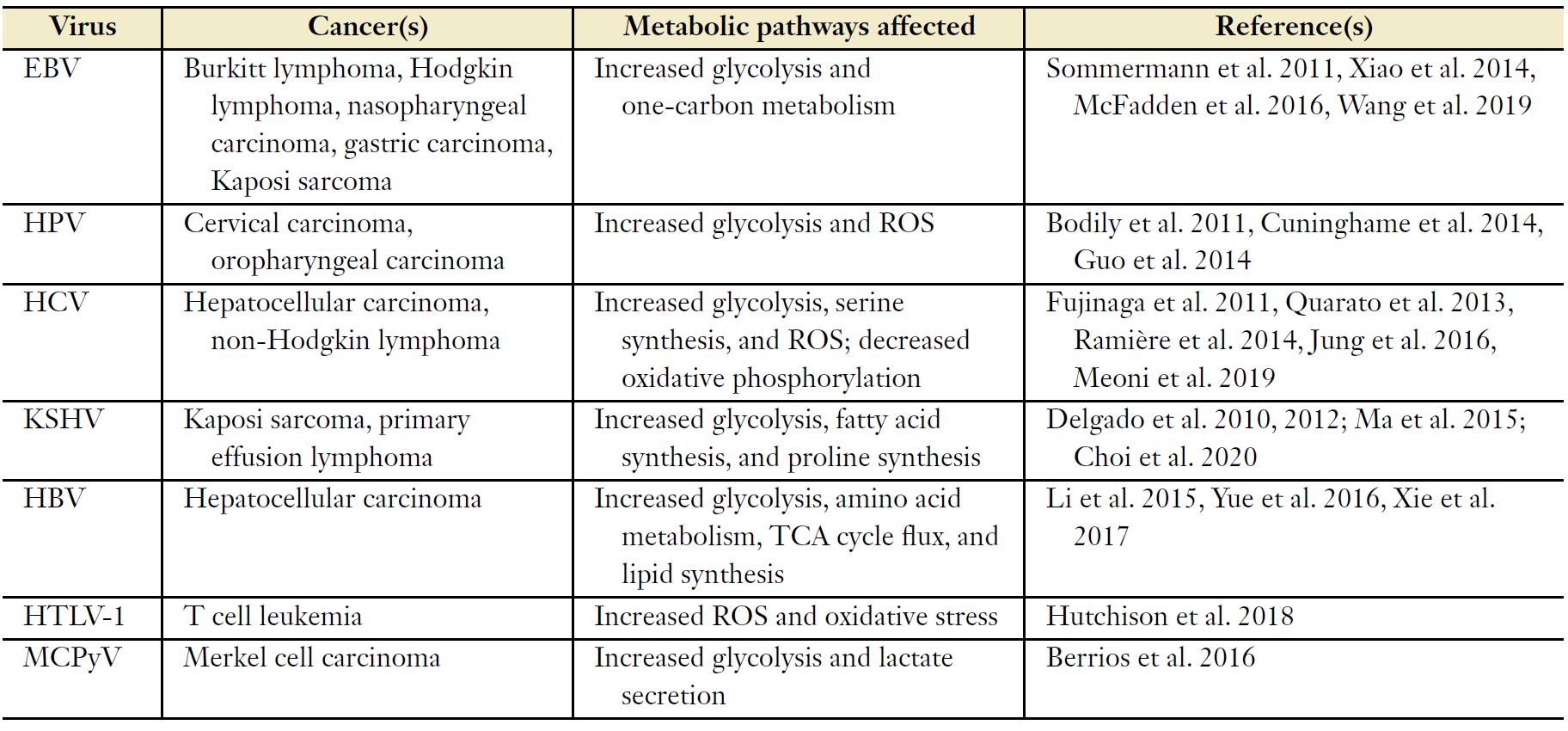The Metabolic Relationship Between Viral Infection and Cancer
Peter J. Mullen and Heather R. Christofk
病毒感染对于肿瘤的发生至关重要,致癌病毒(oncogenic viruses)不但能够将其的遗传信息插入宿主染色体引起基因突变,导致致癌基因的形成和抑癌基因的破坏,还能通过干扰宿主细胞正常代谢来为肿瘤生长提供便利。
病毒代谢与肿瘤发生
某些致癌病毒能够通过劫持宿主代谢获取宿主营养,重塑宿主细胞代谢状态,引起肿瘤发生。病毒感染时,葡萄糖摄取和糖酵解代谢增强,包括丙酮酸代谢、TCA循环、氧化磷酸化在内的代谢改变都与病毒感染和复制密切相关。

Oncogenic viruses rewire core metabolic pathways to increase anabolism. Viruses need host cells to provide macromolecules required for the synthesis of new virus particles. Oncogenic viruses ( gray) target metabolic pathways (red ) that are also altered in tumors, such as glycolysis, nucleotide synthesis, and amino acid synthesis. Abbreviations: CoA, coenzyme A; EBV, Epstein-Barr virus; HBV, hepatitis B virus; HCV, hepatitis C virus; HPV, human papillomavirus; HTLV-1, human T-lymphotropic virus-1; KSHV, Kaposi sarcoma–associated herpesvirus; MCPyV, Merkel cell polyomavirus; TCA, tricarboxylic acid.
致癌病毒与代谢重编程:
国际癌症研究机构(IARC)确定的几种致癌病毒也都与肿瘤发生时的代谢重塑相关。
EB病毒:EBNA2蛋白会靶向激活人类致癌基因myc,LMP2A能够增强PI3K-Akt-mTOR通路活性改变代谢状态,使细胞更容易被转化。
乙型肝炎病毒HBV:核心蛋白HBC上调糖酵解和氨基酸代谢,增加脂肪酸合成和脯氨酸合成。
丙型肝炎病毒HCV:它的NS5A基因能够激活HK2(糖酵解第一个限速酶),并通过增加MYC的表达促进糖酵解和丝氨酸生物合成;而且还能够通过增加丙酮酸脱氢酶(PDH)抑制剂PDK阻止丙酮酸进入TCA循环,最终使糖酵解程度升高,氧化磷酸化程度降低。
人乳头瘤病毒HPV:HPV16有两个主要的癌基因,E6和E7。E6能通过多种途径激活mTORC1和Akt,E7通过阻止PPA2信号对Akt的抑制来维持mTORC1激活状态,从而增加核苷酸合成、谷氨酰胺溶解、脂质合成。并且E6E7还能在低氧条件下稳定HIF-1α,潜在增加血管生成和糖酵解。
卡波氏肉瘤病毒KSHV:KSHV感染的细胞会增加糖酵解、脂肪酸合成、脯氨酸合成。其K1蛋白能够与脯氨酸合成酶PYCR相互作用,增加脯氨酸代谢促进肿瘤形成。
人嗜T-淋巴病毒 HTLV-1:p30Ⅱ蛋白减少病毒复制过程中的ROS和氧化应激水平,阻止肿瘤细胞凋亡。
MCPyV:梅克尔细胞多瘤癌病毒,依赖于MYC上调糖酵解基因和乳酸转运蛋白MCT1,诱导成纤维细胞发生有氧糖酵解,为肿瘤生长创造代谢条件。
Oncogenic viruses and the metabolic changes they cause

总结与展望:

Abstract 摘要:
Viruses are fundamental tools in cancer research. They were used to discover the first oncogenes in the 1970s, and they are now being modified for use as antitumor therapeutics. Key to both of these oncogenic and oncolytic properties is the ability of viruses to rewire host cell metabolism. In this review, we describe how viral oncogenes alter metabolism to increase the synthesis of macromolecules necessary for both viral replication and tumor growth. We then describe how understanding the specific metabolic requirements of virus-infected cells can help guide strategies to improve the efficacy of oncolytic viruses, and we highlight immunometabolism and tumor microenvironment research that could also increase the therapeutic benefits of oncolytic viruses. We also describe how studies describing the therapeutic effects of dietary nutrient restriction in cancer can suggest new avenues for research into antiviral therapeutics.
Keywords 关键词:
cancer metabolism, oncogenic viruses, oncolytic viruses, dietary modification
参考文献:The Metabolic Relationship Between Viral Infection and Cancer
Annual Review of Cancer Biology,Vol. 6:1-15 (Volume publication date April 2022)
DOI:https://doi.org/10.1146/annurev-cancerbio-070120-090423
原文链接:https://www.annualreviews.org/doi/abs/10.1146/annurev-cancerbio-070120-090423
转载本文请联系原作者获取授权,同时请注明本文来自汪凯科学网博客。
链接地址:https://m.sciencenet.cn/blog-446272-1418191.html?mobile=1
收藏


